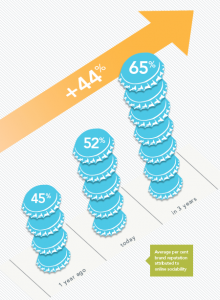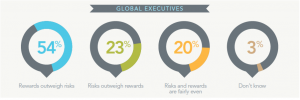5 mgt-9.05.19-PM-300×156.png” alt=”Socialize your brand” width=”300″ height=”156″ />
Being social online is fast becoming critical to being a world class brand. Despite the proliferation of social media outlets and growing penetration of the Internet worldwide, most organizations still struggle to build a brand with a distinctive social identity.
This report is a summary of study done by Forbes and Weber Shandwick. You can find more reports at: http://www.forbes.com/forbesinsights/
Why does brand sociability matter?
It is no longer an open question as to whether brand sociability matters. Global executives attribute 52% of their brand’s reputation to how social it is online today, up from 45% one year ago. They project that 65% of their brand’s reputation will come from its online sociability in three years, a five-year growth rate of 44%.
Why does brand sociability matter?
Sociability is important not only to the brand, but also to the reputation of the entire enterprise: One-third (33%) of all global executives with digital and marketing responsibility consider “quality of online presence or engagement” a primary contributor to a company’s overall reputation. Whereas many of the traditional drivers of reputation such as customer experience and product/service quality remain at the top of the importance list, the addition of “online presence” as a factor in driving reputation today is long overdue for consideration.
Global executives and Social brands
Global executives acknowledge that they have far to go before their companies are truly social: Only a small group of global executives (16%) describe their brand’s sociability as “world class.” Is it worth the intense effort to be a world class social organization? Global senior executives think so – they report that the rewards of using social media far outweigh the risks, by a margin of more than 2-to-1.
9 drivers of world class brand sociability
#1 It’s not the medium — and it’s more than the message
The vast majority of large global companies use social media, making the medium almost ubiquitous. What makes world class social brand organizations stand out is how they differentiate their brands through the medium. World class brands don’t depend on the medium to make them social. They strive to provide unique and engaging content that pull their fans in which allows the brands and fans to enjoy the interactive benefits of social media.
#2 Put your brands in motion
World class social brands are deeply entrenched in social media — eight-in-10 use social networks, three-quarters use blogs, Twitter and YouTube, and at least six-in-10 use mobile apps and crowdsourcing. Usage of all the social brand tools included in our survey are indexed much higher than the average global company.
World class companies don’t just experiment with social media tools. They also apply their social media tools in more ways for their brands than the average global company. For example, they are much more likely than the average global company to host branded podcasts, brand-specific YouTube channels, video blogs, viral videos, proximity-marketing, brand-related mobile content and geo-location tools.
The social activities of world class brands are not static but in motion. They do not exist to occupy space on social networks but are activated for dynamic interaction with their communities of interest.
#3 Integrate or die
Building a truly global social brand with a clear identity that optimizes the customer experience requires rock solid integration. Senior executives of world class social brands are more likely than the average global executive to report that their social strategy is fully integrated into their overall marketing/communications strategy. For world class companies, brand sociability is an enterprise affair. The brand’s social identity is a team endeavor — all levels of the organization are involved.
#4 Make social central
While core strategy should be primarily owned by the brand or “social” officer, it is crucial that talent throughout the organization have the skills to execute as part of a fundamentally social approach to the brand’s business. It is a fact of business life today that employees, intentionally or not, will participate in online conversation about their brands and companies. Therefore, a centralized function needs to support and inform their activities and ensure that clear and accessible social media policies and procedures are in place.
#5 Listen more than you talk
The social activities of world class brands aren’t limited to just pushing out information and thinking the job of brand sociability is done. Executives at world class social brands listen intently to their social media consumers and act on what they hear and learn. For example, they are much more apt than the average global organization to monitor/ research fan pages to determine what customers want, make product or services changes based on fan recommendations and refine messaging based on user demographics or attitudes. They clearly have their ear on their influencers.
#6 Count what matters — meaningful engagement
Nearly all companies report that they are using at least one form of measurement to prove the effectiveness of their brand sociability. There aren’t many differences between the metrics that world class brands use compared to other global brands, but world class brands are more likely to take a big picture view by measuring the most social of metrics, contributors and the business impact of social, such as reduced call volume, revenue contribution and conversion.
#7 Think Global
A strong social brand reputation is directly related to greater recognition of all corporate reputation influencers. When global executives were asked to rate nine drivers of corporate reputation, companies with brands at all social levels agreed that “customer service” is the top driver of a solid reputation. However, executives managing world class social brands consider a company’s “global reach” to be just as important as customer service, while the average global executive ranks it last.
#8 Go outside to get inside
In this new era of multi-channel, multi-discipline marketing, it is often necessary to engage outside experts to achieve or maintain world class status. Our research found that world class companies are more likely to engage outside support to measure their brand’s social performance. More than the average global executive, those at world class companies hire third parties to measure the effectiveness of their social networking and microblogging. These preeminent social companies are intent on engaging the right partners to measure their enterprise-wide social media initiatives with precision.
#9 Be vigilant
Executives of world class brand social companies are 35% more likely than the average global company to report their brand experienced an online crisis in the past year that affected its reputation. These social champions who have dealt with a recent online crisis are no stranger to the risks of the hyper-connected world — two-thirds (66%) report that they deal with negative online commentary on a daily basis (vs. 51% of total global companies).



